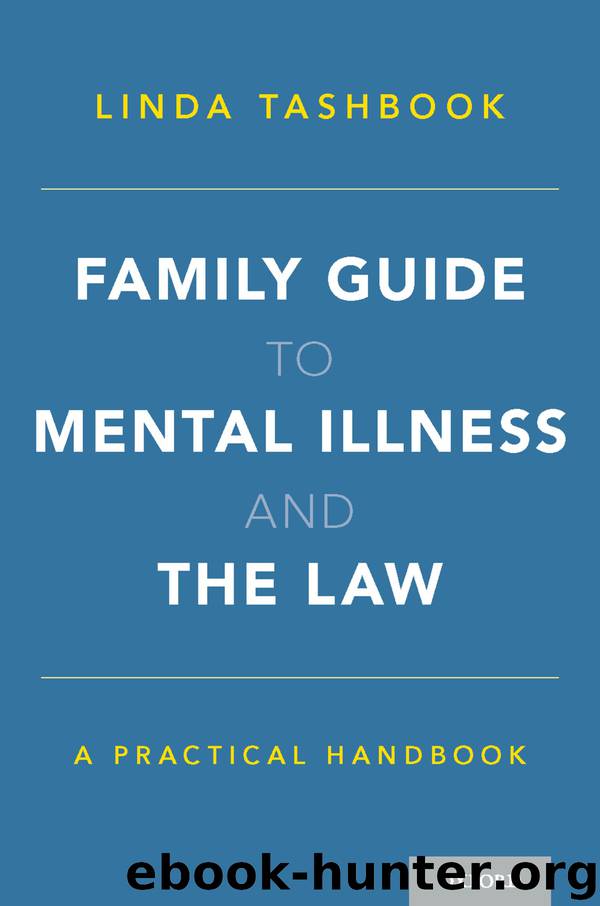Family Guide to Mental Illness and the Law by Linda Tashbook

Author:Linda Tashbook
Language: eng
Format: epub
Publisher: Oxford University Press
Published: 2019-03-18T16:00:00+00:00
Challenge 3: Participating in the Legal Process
The legal process is a rigid collection of rules that are manipulated by opposing parties for the dual purposes of milking every benefit for themselves and thwarting every possible move from the other side. It is incredibly slow. Everything takes a long time, even the evidence gathering. While the lawyer sends requests for documents, waits for the documents to come, and then reads through everything, the plaintiff has little to do with the case but wonder what is going on. The depositions will be scheduled far in advance, but they can still be delayed or rescheduled. The transcripts of the depositions will take a while to come; they have to be reviewed and revised before the lawyers can use them.
As each lawyer files pleadings with the court, the other lawyer will look for problems with them. The lawyers will file motions asking the court to exclude each other’s evidence. They will petition for delays. They will each argue that the other has violated rules.
All of this fussing and stalling happens around the plaintiff, not with the plaintiff. He is not a part of the action. He is in limbo, waiting for a resolution. He may be ready to turn his attention elsewhere. At some point, depending on the jurisdiction, the court may order the parties to try to resolve the matter through mediation or negotiation. This detour away from the traditional court process involves selecting a neutral negotiator or mediator, working out schedules so that the employer, the employee, their lawyers, and the employee’s supportive family member (should he want one there) can all attend as many mediation or arbitration sessions as it takes to either reach a resolution or to conclude that the case should go to trial.
If the parties reach a settlement in the alternative dispute resolution, at least the case will end, but the victimized employee will not have had his day in court. Mediation and arbitration have the benefit of being calm and peaceful ways to resolve disputes, but when all is said and done, some people are disappointed that they didn’t get to experience courtroom drama. If the case does proceed to court, members of the public can show up to watch it—friends, enemies, and strangers. And the record of the trial will be available to people who go looking for it later. The mental health records likely will not become part of the public record, but references to the employee’s mental health condition will be in other case documents since it is a central theme in the case.
Download
This site does not store any files on its server. We only index and link to content provided by other sites. Please contact the content providers to delete copyright contents if any and email us, we'll remove relevant links or contents immediately.
Rewire Your Anxious Brain by Catherine M. Pittman(17581)
Talking to Strangers by Malcolm Gladwell(11865)
The Art of Thinking Clearly by Rolf Dobelli(8836)
Mindhunter: Inside the FBI's Elite Serial Crime Unit by John E. Douglas & Mark Olshaker(7830)
Becoming Supernatural by Dr. Joe Dispenza(7100)
Change Your Questions, Change Your Life by Marilee Adams(6637)
Nudge - Improving Decisions about Health, Wealth, and Happiness by Thaler Sunstein(6629)
The Road Less Traveled by M. Scott Peck(6627)
The Lost Art of Listening by Michael P. Nichols(6465)
Enlightenment Now: The Case for Reason, Science, Humanism, and Progress by Steven Pinker(6404)
Win Bigly by Scott Adams(6306)
Mastermind: How to Think Like Sherlock Holmes by Maria Konnikova(6227)
The Way of Zen by Alan W. Watts(5790)
Daring Greatly by Brene Brown(5636)
Grit by Angela Duckworth(4729)
Big Magic: Creative Living Beyond Fear by Elizabeth Gilbert(4719)
Men In Love by Nancy Friday(4315)
Flow by Mihaly Csikszentmihalyi(4047)
The Four Tendencies by Gretchen Rubin(4018)
